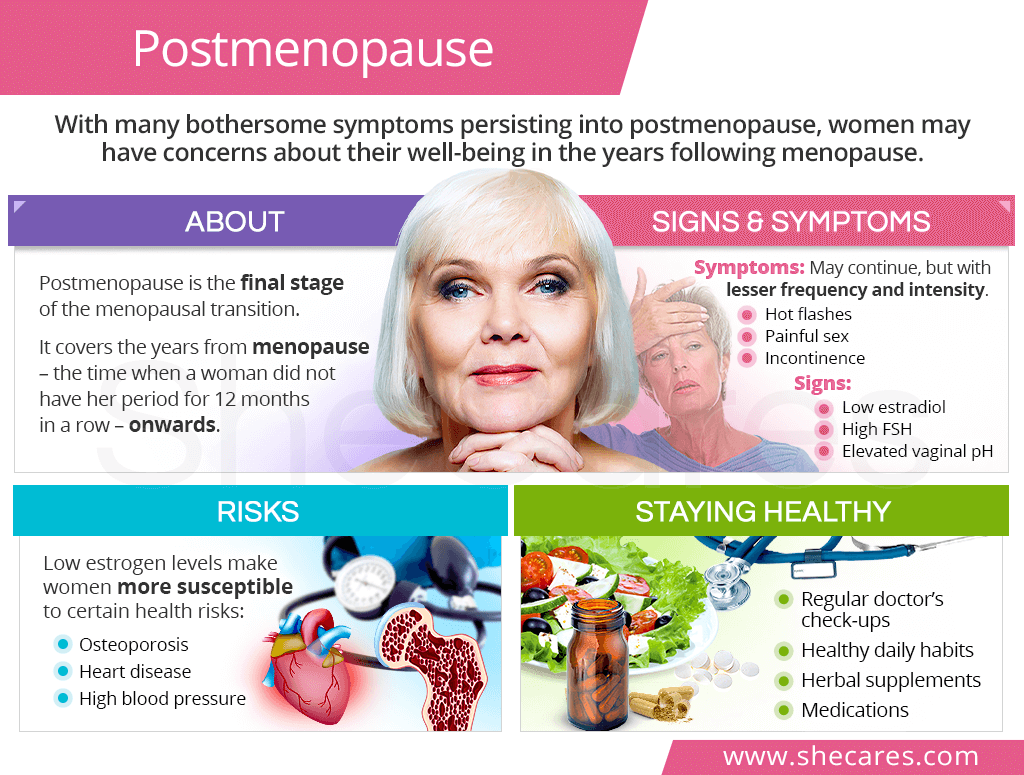What is Postmenopause?
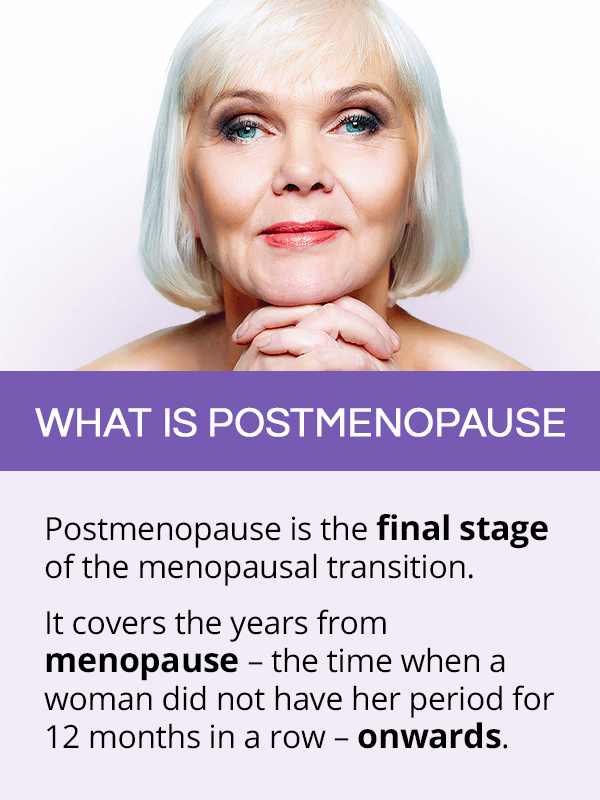
Postmenopause is the final stage of the menopausal transition. It covers the years from menopause - that is, the date when a woman did not have her period for 12 months in a row - onwards.1
Women typically reach their final periods between the ages of 45 and 55.2 This means that they may live in postmenopause for several decades, oftentimes a third or even half of their lifespan.
Postmenopause is a natural result of the ovaries ending their reproductive functions, following a depletion of the eggs they stored throughout a woman's life. Because the majority of the production of estrogen and progesterone took place within the ovaries, their shutdown causes consistently low levels of said hormones during postmenopause.
Postmenopause Signs & Symptoms
A combination of postmenopause signs and symptoms can be used to confirm a woman's postmenopausal status.
Postmenopause Symptoms
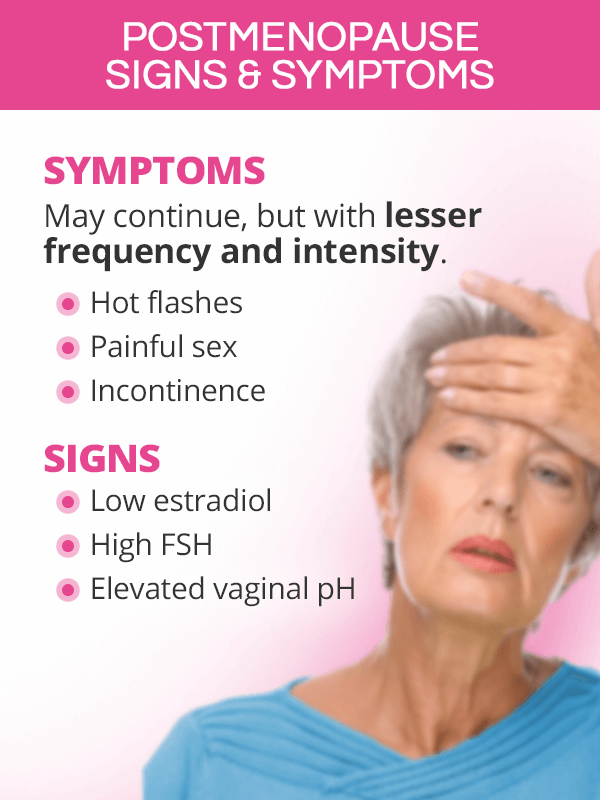
After a woman's final period, menopause symptoms are expected to subside in terms of their intensity and frequency.
However, most women will still experience various bothersome discomforts for the first few years of postmenopause. Some may even struggle with them for over a decade.3
The most common postmenopause symptoms include, but are not limited to, the following:
- Hot flashes and night sweats
- Vaginal dryness
- Loss of libido
- Dyspareunia (painful sex)
- Incontinence
- Weight gain
- Hair loss
- Depression
- Sleep problems
- Difficulty concentrating
Postmenopause Signs
Besides the cessation of menstrual periods, a woman's doctor may also look for objective signs of postmenopause to confirm her entry into this life stage. They include the following:4,5,6
- Low estradiol levels (30 pg/mL and below)
- High follicle-stimulating hormone (FSH) levels (30 IU/L and above)
- Elevated vaginal pH (4.5 and above)
Postmenopause Risks
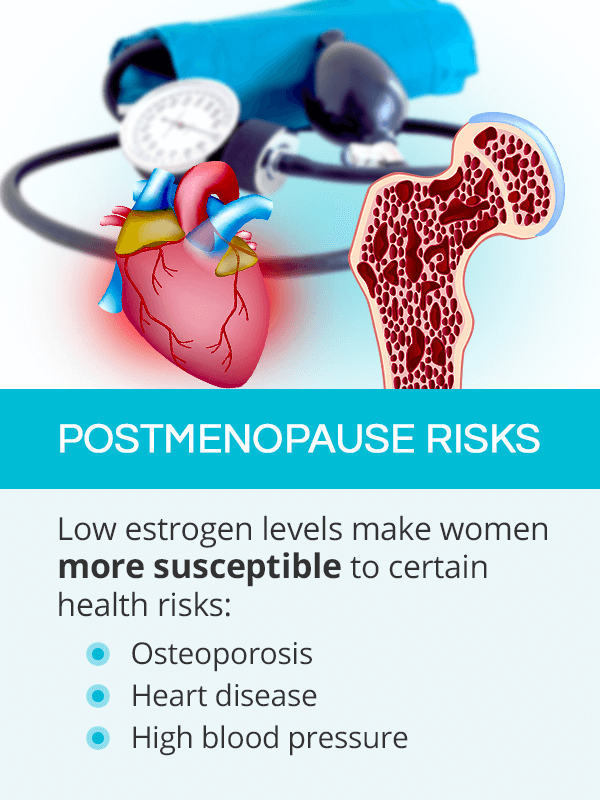
Besides persisting symptoms, postmenopausal women face an increased risk of several health complications.
Throughout their reproductive lives, estrogen and progesterone served numerous health-protective functions, like preventing heart disease and maintaining bone density. Now that their levels remain low, those protective roles are not as well expressed, making women more susceptible of the following menopause problems:
- Osteoporosis. Estrogen loss after menopause may lead to the development of osteoporosis, a disease characterized by reduced bone density. This causes bones to become brittle and weak, increasing women's risk of fractures.
- Heart disease. Hormonal lows may also may lead to an increase in the levels of low-density lipoproteins (LDL) and triglycerides, elevating the risk of developing heart disease after menopause.
- Hypertension. After menopause, about 75% of women have high blood pressure, either due to hormonal shifts, weight gain, or aging itself.4 Untreated hypertension is linked to complications, such as stroke or heart attacks.
Certain postmenopausal lifestyle habits, including leading a sedentary lifestyle and smoking, may further worsen the risks of the aforementioned and other health complications.
Staying Healthy After Menopause
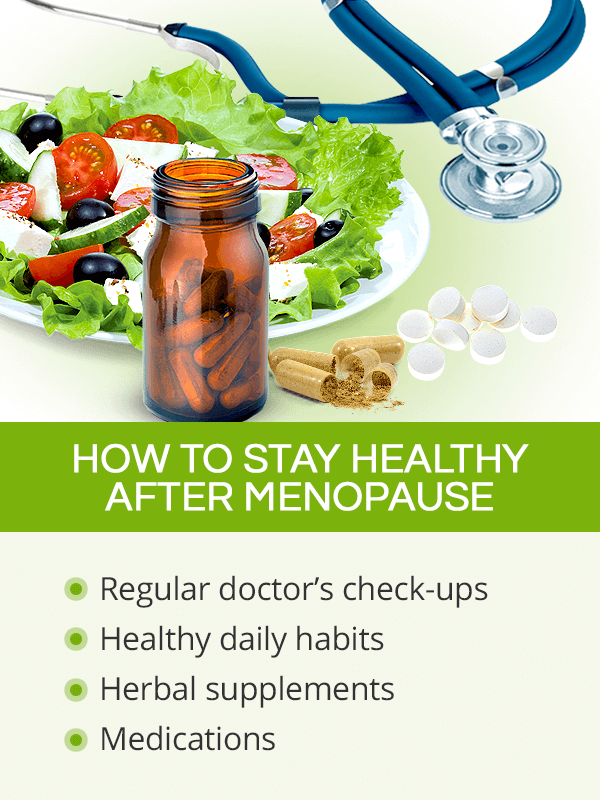
Staying in optimal health and decreasing health risks should be every postmenopausal woman's main goal. Luckily, there are a variety of simple and effective menopause treatment options to accomplish that.
Besides regular doctor's check-ups, including lipid levels and blood pressure screenings, women can consider a variety of healthy practices, alternative solutions, and conventional options, according to their needs.
Healthy Practices
Revising one's daily habits is key to staying healthy after menopause. Worthy recommendations include the following:
- Eat well. Balanced, nutritious meals are the foundation of a wholesome menopause diet. Getting enough calcium and vitamin D can help protect the bones and reduce the risk of osteoporosis.
- Move around. Leading a sedentary lifestyle in postmenopause is the recipe for weight gain, poor circulation, high cholesterol, bone mass loss, and sleep problems. Regular menopause exercise can counteract these negative effects.
- Nourish your sex life. To relieve vaginal dryness and painful sex in postmenopause, women can boost blood flow to genitals through regular intercourse, longer foreplay, or masturbation. Water-based lubricants are also helpful.
- Take care of your mental health. Unresolved emotional problems and prolonged stress can take a huge toll on women's mental state. Help can be found via local support groups, one's physician, and stress-relieving practices.
- Quit addictions. Combating addictions to nicotine and reducing alcohol intake can help women maintain optimal postmenopausal health and reduce the risk of heart problems.
Alternative Solutions
Non-conventional medicine gives women various options for staying healthy, including herbal supplements for menopause:
- Phytoestrogenic supplements. Naturally rich in estrogen-like compounds, called phytoestrogens, these supplements can help balance hormones in the short-term. Great options include black cohosh and red clover, among others.
- Hormone-regulating supplements. To maintain hormonal balance long-term during postmenopause, women can consider herbal supplements, like Macafem, which act directly on the endocrine glands to regulate their functions.
Conventional Options
Many women will not need any pharmacological treatment for postmenopause symptoms. If necessary, menopause medications may be suggested by a doctor based on the severity of persisting symptoms, age, health status, and risks factors.
- Hormone replacement therapy (HRT) can potentially reduce postmenopausal risks. However, due to serious health concerns with its long-term use, HRT is recommended short-term only for severe symptoms or significant health risks.
- Other medications will be tailored to experienced symptoms, including antidepressants and osteoporosis medications, among others.
Postmenopausal women may also take advantage of psychotherapy, such as cognitive-behavioral therapy, to reduce the emotional as well as physical burden of the transition.
Key Takeaways
When women finally reach postmenopause, they often wonder about their health in the years to come. Because of low reproductive hormone levels characteristic of the years after menopause, women face higher risks of a number of health complications. This includes osteoporosis and heart disease, not to mention various symptoms that may persist into this life stage from the perimenopausal years. However, with knowledge, regular check-ups, and a handful of healthy practices, women can maintain good health and decrease serious health risks long into their postmenopausal years.
Sources
- BCMJ. (2001). HRT in older women: Is It Ever Too Late? Retrieved February 25, 2021 from https://bcmj.org/articles/hrt-older-women-it-ever-too-late
- Chronic Diseases and Translational Medicine. (2015). Primary osteoporosis in postmenopausal women. Retrieved February 25, 2021 from https://www.ncbi.nlm.nih.gov/pmc/articles/PMC5643776/
- FDA. (2019). Menopause. Retrieved February 25, 2021 from https://www.fda.gov/consumers/womens-health-topics/menopause
- Harvard Health Publishing. (2013). High blood pressure a silent danger in postmenopausal women. Retrieved February 25, 2021 from https://www.health.harvard.edu/heart-health/high-blood-pressure-a-silent-danger-in-postmenopausal-women
- Harvard Health Publishing. (2020). Treating female pattern hair loss. Retrieved February 25, 2021 from https://www.health.harvard.edu/staying-healthy/treating-female-pattern-hair-loss
- FDA. (n.d.). Menopause. Retrieved February 25, 2021 from https://www.fda.gov/consumers/womens-health-topics/menopause
- Johns Hopkins Medicine. (n.d.). Staying Healthy After Menopause. Retrieved February 25, 2021 from https://www.hopkinsmedicine.org/health/conditions-and-diseases/staying-healthy-after-menopause
- Mayo Clinic. (2019). Menopause and high blood pressure: What' the connection? Retrieved February 25, 2021 from https://www.mayoclinic.org/diseases-conditions/high-blood-pressure/expert-answers/menopause-and-high-blood-pressure/faq-20058406
- University of Utah. (n.d.). Postmenopause. Retrieved February 25, 2021 from https://healthcare.utah.edu/womenshealth/gynecology/menopause/postmenopause.php
Footnotes:
- Office on Women's Health. (2019). Menopause. Retrieved February 25, 2021 from https://www.womenshealth.gov/menopause
- Cleveland Clinic. (2019). Menopause, Perimenopause and Postmenopause. Retrieved February 25, 2021 from https://my.clevelandclinic.org/health/diseases/15224-menopause-perimenopause-and-postmenopause
- Indian Journal of Psychiatry. (2015). Postmenopausal syndrome. Retrieved February 25, 2021 from https://www.ncbi.nlm.nih.gov/pmc/articles/PMC4539866/
- American Heart Association. (2009). Postmenopausal Hypertension. Retrieved February 25, 2021 from https://www.ahajournals.org/doi/10.1161/hypertensionaha.108.120022
